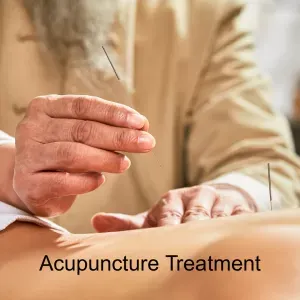By Qineng Tan, L.Ac., Ph.D. and Xiaomei Cai, L.Ac., Ph.D.

Bloody pee? Left side pain between your ribs and hip bone? Dizziness when you go to stand up? These can all be signs of Nutcracker Syndrome, or a compressed vein on your left side. Acupuncture and TCM can be used as an adjunct treatment for Nutcracker Syndrome to help relieve pain and improve blood flow.
What Is Nutcracker Syndrome?
Nutcracker Syndrome (NCS) is a rare vascular compression disorder that occurs when the left renal vein (LRV) becomes compressed, most commonly between the abdominal aorta and the superior mesenteric artery. This compression impedes blood flow from the left kidney, causing increased venous pressure that can lead to a wide range of symptoms.
Symptoms of Nutcracker Syndrome
The most common symptoms of NCS include chronic pain in the left flank or abdomen and/or blood in the urine.
Many patients also experience pelvic pain or a feeling of pelvic congestion, especially women during menstruation.
Men may develop a varicocele, a swelling of the veins within the scrotum. Other symptoms can include fatigue, dizziness, orthostatic intolerance (feeling lightheaded upon standing), and in some cases, headaches resulting from spinal vein congestion.
The most common signs of Nutcracker Syndrome include:
- Chronic left-sided flank or abdominal pain
- Hematuria (blood in the urine)
- Proteinuria (protein in the urine)
- Pelvic pain or congestion, often worsening with standing or during menstruation
- Varicocele in men
- Fatigue, occasional dizziness or syncope
- Orthostatic intolerance (lightheadedness upon standing)
- Headache
Because these symptoms can be non-specific and vary in intensity, NCS is often difficult to diagnose.
How Is Nutcracker Syndrome Treated?

Diagnosis of Nutcracker syndrome usually begins with imaging studies. A Doppler ultrasound is often used as an initial screening tool because it is non-invasive and effective at detecting abnormalities in blood flow. More detailed imaging with CT or MRI scans can confirm the compression of the renal vein and rule out other potential causes. In some cases, venography with pressure measurements is necessary to definitively diagnose NCS, as it can directly measure the pressure gradient across the compressed vein.
In Western medicine, treatment options for NCS depend largely on the severity of symptoms. For mild or moderate cases, especially in children and adolescents, conservative treatment may be advised. This can include observation, weight gain to alter the angle between the arteries, and medications such as ACE inhibitors to manage blood pressure and reduce proteinuria.
For more severe cases, particularly when quality of life is affected or there is significant hematuria or kidney function compromise, surgical intervention may be recommended. Surgical options include transposition of the renal vein, renal autotransplantation, or endovascular stenting. Each of these carries its own risks and benefits, and decisions are made on a case-by-case basis.
While these interventions focus on the anatomical problem, acupuncture and Traditional Chinese Medicine (TCM) offer a complementary approach that addresses the systemic effects of the condition.
Can Acupuncture Help Nutcracker Syndrome?

Acupuncture is widely known for its ability to reduce pain and inflammation, and it has been used effectively to treat symptoms similar to those experienced by NCS patients. Although specific research on acupuncture for NCS is limited, there is growing evidence that acupuncture can help relieve flank pain, regulate blood flow, and improve autonomic function.
According to TCM theory, Nutcracker Syndrome can be understood as a combination of Qi stagnation, blood stasis, and deficiencies in the Kidney and Spleen systems. The Kidney in TCM governs water metabolism and structural integrity, while the Spleen is responsible for transporting fluids and maintaining overall balance in the body. When these systems are out of harmony, blood flow becomes sluggish and can lead to congestion and pain, like the impaired venous drainage seen in NCS.
Treatment with acupuncture typically involves selecting points that invigorate blood circulation, strengthen Kidney and Spleen Qi, and relieve pain.
Moxibustion may also be used to warm the Kidney area and promote circulation. In addition to acupuncture, Chinese herbal medicine can play a vital role. Customized herbal formulas may be prescribed to address individual patterns and promote healing.
Acupuncture Near Me for Nutcracker Syndrome in West Los Angeles
At Art of Wellness Acupuncture near Santa Monica, we offer a holistic approach to healing. For patients suffering from Nutcracker Syndrome, acupuncture and TCM offer a non-invasive, supportive pathway to symptom management and overall well-being. If you’re experiencing chronic pain in your side, hematuria, or other related symptoms and are looking for a natural, integrative approach, please don’t hesitate to reach out to us at Art of Wellness Acupuncture in West Los Angeles. We are here to help you find relief.
*This article is for education from the perspective of Traditional Chinese Medicine only. The education provided by this article is not approved by FDA to diagnose, prevent, treat and cure human diseases. It should not stop you from consulting with your physician for your medical conditions. Traditional Chinese Medicine is based on Qi, which is an invisible force that usually cannot be observed by modern science. Because science focuses on testing ideas about the natural world with evidence obtained through observation, these aspects of acupuncture can’t be studied by science. Therefore acupuncture and Chinese herbs are often not supported by double-blind, randomized trials, and they are considered alternative medicine therapies in the United States.
